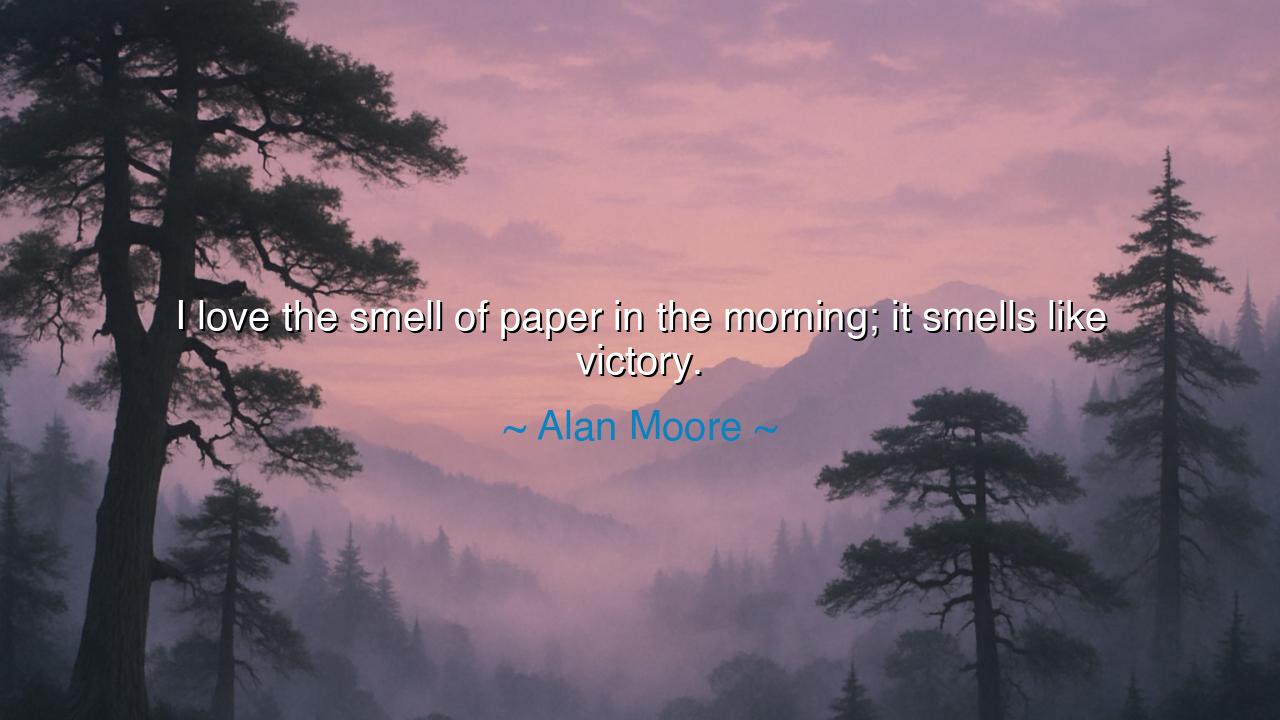
I love the smell of paper in the morning; it smells like






The words of Alan Moore, “I love the smell of paper in the morning; it smells like victory,” ring with the resonance of a warrior’s cry, yet they are spoken by a craftsman of words. Here is no soldier standing upon the smoking battlefield, but a writer, pen in hand, who knows that his battleground is the page, and his triumph is creation itself. The paper, blank and waiting, becomes the field upon which imagination marches, and its scent in the morning is as intoxicating to him as the banners of conquest were to the ancients. His quote reminds us that for the artist, for the thinker, for the one who labors with words, the true victories are not written in blood, but in ink.
The origin of this phrase rests in Moore’s life as a visionary writer of comics and literature. To him, the act of writing was not a pastime, but a struggle of spirit, a constant contest with the void of the unwritten. Morning, when the mind is sharpest and the day unspoiled, was his chosen hour of battle. The smell of paper then was no trivial thing—it was the fragrance of potential, the perfume of possibility. Like the soldier who sharpens his sword at dawn, Moore took up his pen, and the scent of paper was his call to arms.
History too reflects this truth. Think of Johannes Gutenberg, who in the fifteenth century brought forth the printing press. For him and for those first printers, the smell of ink upon paper was the herald of a revolution. Each page pressed was a victory over ignorance, a blow struck against the darkness of illiteracy. Where once knowledge was hoarded, now it was spread, and the fragrance of paper and ink was indeed the scent of triumph. Moore’s words, though personal, carry the weight of this same tradition: every written word is a victory against silence.
Or consider Winston Churchill, who during the darkest hours of war wielded not guns, but words. His speeches, written first upon humble sheets of paper, rallied a nation against despair. Those drafts, carried in his hand, were as potent as armies. The smell of the paper upon which they were written could rightly be called the smell of victory, for it was through the power of language that courage was kindled and tyranny resisted. Thus Moore’s phrase is not exaggeration, but truth clothed in metaphor: the page is the forge where futures are made.
The lesson for us is clear: never underestimate the small beginnings of great things. A blank page may seem nothing, just as a single brick may seem small—but in it lies the foundation of cathedrals, the seed of revolutions, the spark of victories yet to come. To embrace the page, to labor over it, to breathe in its scent with reverence, is to recognize the sacredness of creation. Every idea written down is a triumph of order over chaos, of vision over emptiness.
Practically, this calls us to honor the act of writing, of recording, of creating. Whether through journaling, storytelling, planning, or dreaming upon paper, we participate in the same ritual that Moore exalts. Approach your pages each morning as a warrior approaches the field. Begin the day not in distraction, but with focus, and let the pen carve meaning from the silence. Treat the page not as trivial, but as sacred ground upon which you, too, may win victories of thought and spirit.
So, beloved listener, take Alan Moore’s words into your heart: “I love the smell of paper in the morning; it smells like victory.” Let them remind you that every page holds power, and every morning offers you the chance to triumph. You need no battlefield to be victorious, for the true victories of humanity are won in the realms of creation, wisdom, and imagination. Take up your pen, take up your thoughts, and march boldly into the blank expanse—for there, if you persist, you too shall breathe the fragrance of victory.






AAdministratorAdministrator
Welcome, honored guests. Please leave a comment, we will respond soon